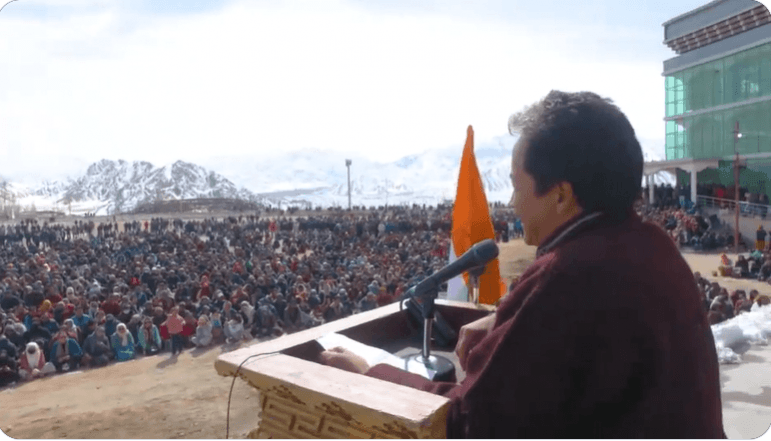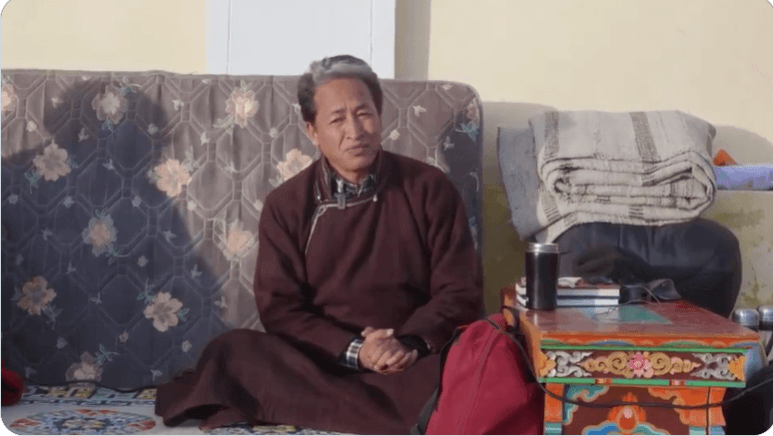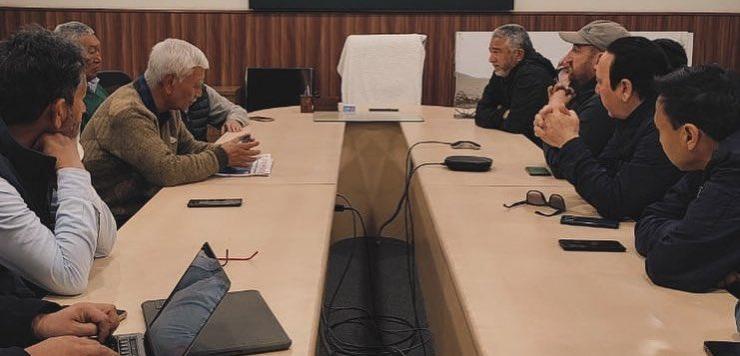
Notwithstanding claims of their leaders, differences appeared to be cropped up among agitating groups of Ladakh as the bandh call given by some religious organizations failed to evoke a response in the Kargil district of this mountainous belt.
The bandh call was given by some religious groups after talks with the agitating groups and the High Powered Committee of the Ministry of Home Affairs ended in a deadlock.
While all business and commercial establishments in Leh district, including Nubra Valley, remained closed throughout the day on the shutdown call given by various religious organizations, it had no impact in Kargil district and adjoining localities including Zanskar Valley.
The shutdown call failed to get a response in Kargil town where all commercial establishments remained open and there were no restrictions on public transport.
Sources said that representatives of Kargil were annoyed that they were not taken into confidence while giving a bandh call.

Sonam Wangchuk starts a 21-day climatic fast
The education reformist-cum-innovator Sonam Wangchuk started his 21-day climatic fast after the bandh to mount pressure on the Union Government to fulfill the demands of the people of Ladakh.
Sonam Wangchuk demanded a legislative assembly in the Union Territory of Ladakh to install a popular government.
Wangchuk expressed gratitude to the Central government, led by Prime Minister Narendra Modi, for granting Ladakh the status of a separate Union Territory. However, he also voiced concerns, likening their situation to being saved from kidnappers only to be put up for sale in a roundabout manner.
#SAVELADAKH #SAVEHIMALAYAS
— Sonam Wangchuk (@Wangchuk66) March 6, 2024
Sonam Wangchuk appeals to the world to live simply,
starts #ClimateFast of 21 days (extendable till death)
Please watch full video in English here:https://t.co/XHkcIdQQ7b#ILiveSimply #MissionLiFE #ClimateActionNow pic.twitter.com/KQi5EMro9X
He highlighted the absence of a political platform for Ladakh, unlike other states, to advocate for their needs, emphasizing the community's desire for a Union Territory with a Legislative Assembly.
Wangchuk debunked the misconception that implementing the Sixth Schedule of the Constitution would hinder the region's development.
Instead, he argued it would establish autonomous hill development councils in different parts of Ladakh in which peoples' representatives would play an important role in the decision-making processes.
Wangchuk recalled that the BJP has repeatedly promised a sixth schedule in its election manifestos for the people of Ladakh. He underscored Ladakh's overwhelmingly indigenous tribal population, expressing confidence that the Central government would prioritize their welfare.

Meeting with the Centre ended in a deadlock
The meeting with the representatives of Leh Apex Body (LAB) and Kargil Democratic Alliance (KDA) on March 4 ended with a deadlock.
A sub-committee constituted by the Ministry of Home Affairs refused to accept two key demands—Statehood to Ladakh and the region's inclusion in the Sixth Schedule of Constitution, of the people of Ladakh
This was the fourth round of talks between MHA and Ladakh leaders. Two sides have had three rounds of dialogue so far—on December 4, 2023, and February 19 and February 24 this year.
On February 3 this year, a complete shutdown was also observed across Ladakh as thousands of protestors marched demanding statehood and constitutional protections under the sixth schedule for the Union Territory.
Some reports suggested that the Central Government is ready to grant constitutional safeguards to protect the land and job rights of the residents of Ladakh through the elected bodies of the cold desert.
Reports quoting sources said that during the crucial meeting on March 4, representatives of the Ministry of Home Affairs assured granting constitutional safeguards to the residents of Ladakh but agitating groups were adamant about bypassing the elected bodies.

















